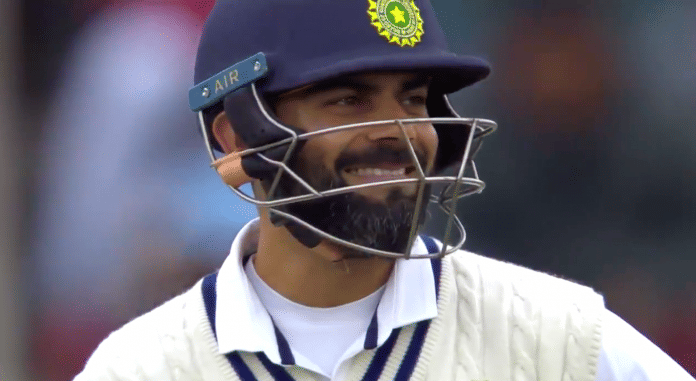In the Insider.Com’s 2020 rankings of most influential sportspersons in the world, India cricket captain Virat Kohli was at number 5, just behind a trio of football superstars and American basketball player Lebron James. This is not unusual for ‘King Kohli’, who is also number 4 on Nielsen’s list of the World’s Most Marketable Athletes and has a statue at Madame Tussauds. This week, he led India against New Zealand in the final of the first World Test Championships in Southampton.
Unfortunately for Kohli, at the pre-match press conference, he found himself confronted with something that had been unnoticed over a dozen years of such interactions: two Coca-Cola bottles kept on the table in front of him. Thanks to Portuguese captain Cristiano Ronaldo’s recent gesture of removing the Coke bottles out of camera-shot at the European Championship and its consequences on the company’s share price, all eyes were on Kohli to see what he would do. After all, Kohli is an avowed fan of the Juventus player, describing him as an inspiration, and one with an unmatched work ethic. Those who have seen the transformation of Kohli’s fitness from 2012 onwards attribute the drastic change in diet and fitness to Ronaldo’s own regimen that had allowed him to match the exploits of Argentine footballer and Barcelona legend, Lionel Messi. Yet, both Kohli and his opposing number, New Zealand cricket captain Kane Williamson, ignored the bottles and left them in full view of the cameras.
Many among Kohli’s whopping 175 million social media fanbase were immediately critical. One referred to him as a “fake Ronaldo fanboy”, a few said they were “disappointed” and a particularly harsh one lauded international stars as having “more guts” than their Indian counterparts.
To put it mildly, this is unfair.
Unlike Ronaldo, who spends most of his time peddling his wares for the clubs in Europe, Kohli is almost always on national duty, and hence the lion’s share of his fans are from here – one-and-a-half billion Indians. Like Sunil Gavaskar and Sachin Tendulkar before him, the expectations of the Indian fan come to rest heavily on Kohli’s shoulders when he comes out to bat. Most of the Indian fans are young, impressionable and unforgiving. Only victory ensures that a player doesn’t have his effigy burned outside his houses or torched on the internet.
Also read: Ronaldo’s Coke snub is a start. Over to Indian celebs to tell us ‘darr ke aage obesity hai’
Kohli, on and off the field
Evidence of this was found in March 2015 when actor Anushka Sharma, Kohli’s then girlfriend and now wife, was unfairly targeted for his failure in the semi-final of the World Cup against the hosts, Australia. In a sport accustomed to silence from its stars, and in a nation known for its chauvinism, Kohli broke the mould.
At the end of a press conference the following week, he asked journalists to wait and spoke at length about how he was dismayed and hurt with the way Anushka had been targeted and blamed for his performance. This uncharacteristic display of emotion sent a strong message to the Indian public and to his own players – that of drawing lines when it came to intrusion and bullying. Anushka herself is no shrinking violet. As a top actor-producer in Indian cinema, she regularly uses her voice for a range of issues from women’s empowerment to the protection of animals. Kohli is content playing second fiddle to her in most media interactions and unhesitatingly praises her common sense and patience for making him a more well-rounded personality. For a male-dominated Indian psyche, to see such acknowledgment of the woman in the celebrity space is nothing short of revolutionary.
In 2017, Kohli once again made waves by shockingly declining to renew his lucrative Rs 8 crore contract with Pepsi. “If I myself won’t consume such things, I won’t urge others to consume it, just because I am getting money out of it,” was how Kohli explained it to a news channel. At the same time, he also dropped his association with fairness creams – a beauty industry that is worth over Rs 5,000 crore in colour-conscious India.
When Australia’s Steve Smith returned from a ball-tampering ban to take the field against India in 2019, he was booed by several Indian fans until Kohli walked up to them and asked them to stop, even apologising to Smith on their behalf. Kohli would win the Spirit of Cricket award for this and capture hearts across the globe.
When India travelled down under last December, Kohli announced that he would be returning home after the Adelaide Test as Anushka was expecting their first child. The powerful BCCI had to hunker down and in unprecedented fashion, allow paternity leave for an Indian cricketer. In February, Kohli was careful to use only the hashtag #IndiaTogether in the wake of the farmer protests, eschewing the divisive #IndiaAgainstPropaganda, which targeted celebrities like Rihanna and environmental activist Greta Thunberg who had supported the agitation.
While India reeled under the onslaught of Covid’s second wave last month, Kohli and Anushka took to crowdfunding over Rs 11 crore in a week to provide oxygen and health support to those in need.
On the field, Kohli is a sublime artist but an unforgiving, relentless opponent. He has been censured often for his language and the hostility he unleashes on his rivals. But like all great sportspersons, he leaves it on the pitch. Off the field, he is an inspiration as a husband, a father and a citizen to the millions of fans he has in India and around the world.
Virat Kohli can leave the bottles where they are.
The author is a Senior Advocate, Supreme Court of India. He was the secretary of the Lodha Committee. Views are personal.
(Edited by Prashant Dixit)






